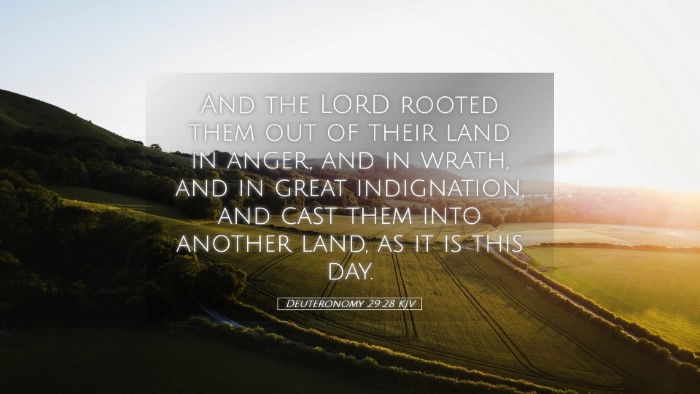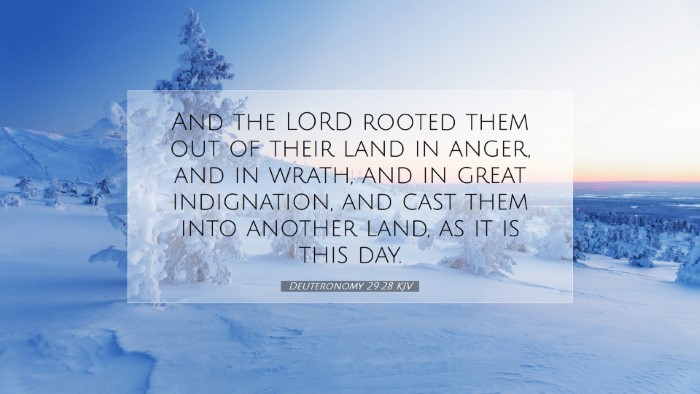Commentary on Deuteronomy 29:28
Verse (Deuteronomy 29:28): "And the secret things belong unto the LORD our God: but those things which are revealed belong unto us and to our children for ever, that we may do all the words of this law."
Introduction
Deuteronomy 29:28 encapsulates profound truths about God's sovereignty and the responsibility of His people to heed His revelations. In this commentary, we will explore the insights drawn from prominent public domain commentators such as Matthew Henry, Albert Barnes, and Adam Clarke. These insights will help illuminate the meaning of this verse for pastors, students, theologians, and Bible scholars.
Understanding the Context
The book of Deuteronomy serves as a restatement and reaffirmation of God's covenant with Israel. This particular chapter emphasizes the consequences of disobedience and the blessings of following God's commands. Moses declares the importance of obedience and the consequences of rebellion, which leads to the broader discussion about God's secret and revealed knowledge.
Commentary Insights
Matthew Henry's Commentary
Matthew Henry highlights the sovereignty of God in the phrase "the secret things belong unto the LORD our God." He emphasizes that there are matters pertaining to God's will and purposes that are beyond human understanding. These "secret things" encompass the divine counsel and plan that are not disclosed to humanity.
Henry stresses that believers are called to trust in God's wisdom regarding what remains hidden from us. Instead of dwelling on what we cannot comprehend, our focus should align with what has been revealed, particularly God's laws and commandments. He reflects that the revealed truths are meant for our instruction and the well-being of subsequent generations.
Albert Barnes's Notes on the Bible
Albert Barnes expands upon the notion of "secret things" by interpreting them as the mysteries of divine providence. He acknowledges that while the fate of nations and individuals often appears inscrutable, God remains in ultimate control. Barnes articulates that believers must accept that not all divine purposes can be comprehended, suggesting that trust in God’s oversight is essential.
Barnes emphasizes the significance of the "things which are revealed" as guidelines for ethical conduct and spiritual life. He argues that these are not merely for individuals but also carry an obligation towards the next generation. This underscores a collective responsibility where the truths of God are to be preserved and passed on through teaching, ensuring that communities remain grounded in spiritual obedience.
Adam Clarke's Commentary
Adam Clarke provides additional depth by contemplating the implications of God's secrets and revelations. He highlights that God's "secret things" encompass aspects of God's plan and purposes, implying a distinction between divine knowledge and human understanding. Clarke encourages believers to approach this awareness with humility, recognizing that our finite minds are incapable of grasping the entirety of God's wisdom.
Furthermore, Clarke emphasizes the transformative nature of God's revelations—they are intended to inspire action and compliance with the Law. He asserts that the knowledge given to us through Scripture serves as a foundation for moral and spiritual living, reinforcing the need for active obedience among God’s people, and the transmission of these truths to future generations.
Theological Implications
The study of Deuteronomy 29:28 reveals several poignant theological implications. Firstly, it stresses the tension between divine mystery and human comprehension, calling believers to embrace a posture of faith amidst uncertainties. The acknowledgment of God's sovereignty invites reflection on how believers can cultivate trust even when faced with unanswered questions about fate and divine actions.
Secondly, the call to pass on revealed truths emphasizes a generational responsibility in spiritual education. There is an inherent duty for believers to instruct one another and their children in the ways of God, ensuring that the legacy of faith is perpetuated.
Lastly, the practical application of revealed knowledge, as advocated by Henry, Barnes, and Clarke, urges believers to translate their understanding of God's laws into action, placing an emphasis on obedience as both personal and communal.
Conclusion
In summary, Deuteronomy 29:28 serves as a profound reminder of God’s sovereignty in the midst of human limitation. The multifaceted interpretations from Matthew Henry, Albert Barnes, and Adam Clarke highlight the necessity of aligning our focus on what God has revealed and the importance of transmitting these truths to future generations. For pastors, theologians, and scholars, this verse calls for a deep exploration of faith that nurtures trust in God's plans while actively engaging in the life of obedience that God requires.


